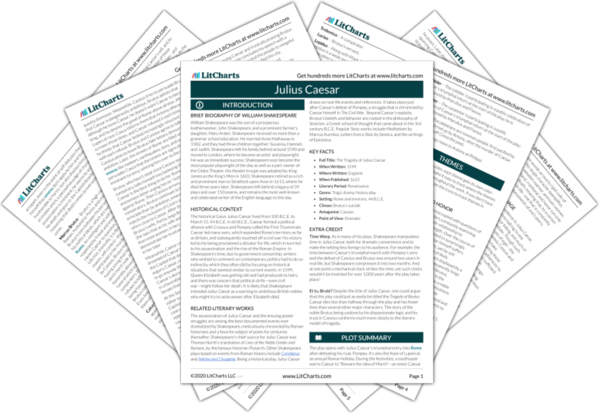Minor Characters
Casca
Casca is one of the conspirators. He is an adherent of the Cynic school of philosophy—a type contrasted with the stoicism of Brutus and the Epicureanism of Cassius—and is therefore sarcastic and rude. Casca is the first of the conspirators to stab Caesar, after which the others follow suit.
Calpurnia
Calpurnia is Caesar’s wife. She suffers from infertility. Calpurnia is associated with supernatural omens in the play. She dreams of Caesar’s murder and accordingly begs him to stay home from the Capitol, but he refuses on the grounds that not going to the Capitol would appear cowardly.
Decius Brutus
A conspirator. His job is to ensure that Caesar shows up to the Capitol on the day of the assassination.
Metellus Cimber
A conspirator. The case of his brother Publius’s banishment forms a pretext for Caesar’s assassination in the Capitol.
Caius Ligarius
A conspirator.
Cinna
A conspirator. The mob attacks Cinna the poet after Caesar’s death, confusing Caesar with Cinna.
Lepidus
Along with Mark Antony and Octavius Caesar, Lepidus is a weak member of the Second Triumvirate, tolerated by the other two as an easily manipulated errand-boy.
Flavius
One of the first characters to speak in the play, Flavius is a tribune. He questions some commoners, including a carpenter and a cobbler, regarding the public celebration of Caesar’s victory. He is later executed for defacing statues of Caesar.
Murellus
One of the first characters to speak in the play, Murellus is a tribune. He questions some commoners, including a carpenter and a cobbler, regarding the public celebration of Caesar’s victory. He is later executed for defacing statues of Caesar.
Publius
Metellus’s brother. A Senator who was banished by Caesar and is therefore sympathetic to the conspirators.
Popilius Laena
A Senator who expresses sympathy to the conspirators at the beginning of Act 3.
Soothsayer
During the Lupercal festivities, the soothsayer warns Caesar to “Beware the ides of March.” He tries a second time to forewarn Caesar before he is assassinated, but to no avail.
Artemidorus
Somehow having learned of the conspiracy, Artemidorus attempts to intercept Caesar outside the Capitol, but Caesar declines to read his letter of warning.
Cinna the Poet
At the end of Act 3, Cinna the Poet is pursued by the plebeians on the way to Caesar’s funeral. Even though he insists that he’s not Cinna the conspirator, he is carried off by the vengeful mob.
Pindarus
Cassius's indentured servant, who assists his suicide.
Titinius
One of Cassius's officers.
Messala
One of Brutus's officers.
Varrus
One of Brutus's officers.
Claudio
One of Brutus's officers.
Young Cato
Portia’s father and one of Brutus’s officers.
Strato
An officer of Brutus, who assists his suicide.
Volumnius
One of Brutus's officers. He declines to assist Brutus’s suicide.
Dardanius
One of Brutus's officers. He declines to assist Brutus’s suicide.
Clitus
One of Brutus's officers. He declines to assist Brutus’s suicide.
Poet
Interrupts an argument between Brutus and Cassius.
Cobbler
The cobbler is participating in a public celebration of Caesar’s triumphal return at the start of the play; he is questioned by Marullus and Flavius.
Carpenter
The carpenter is participating in a public celebration of Caesar’s triumphal return at the start of the play; he is questioned by Marullus and Flavius.
Plebeians
The plebeians are common people, first pacified by Brutus, then stirred up by Antony, after the murder of Caesar. They also carry off Cinna the poet.
Messenger
Brings news to Antony at Philippi.
